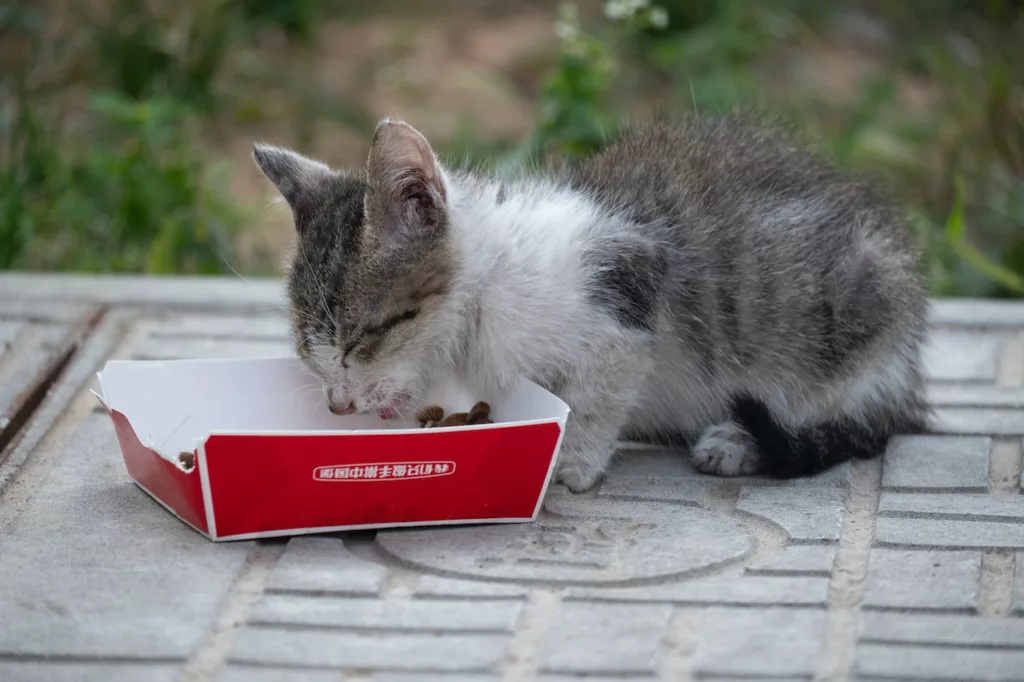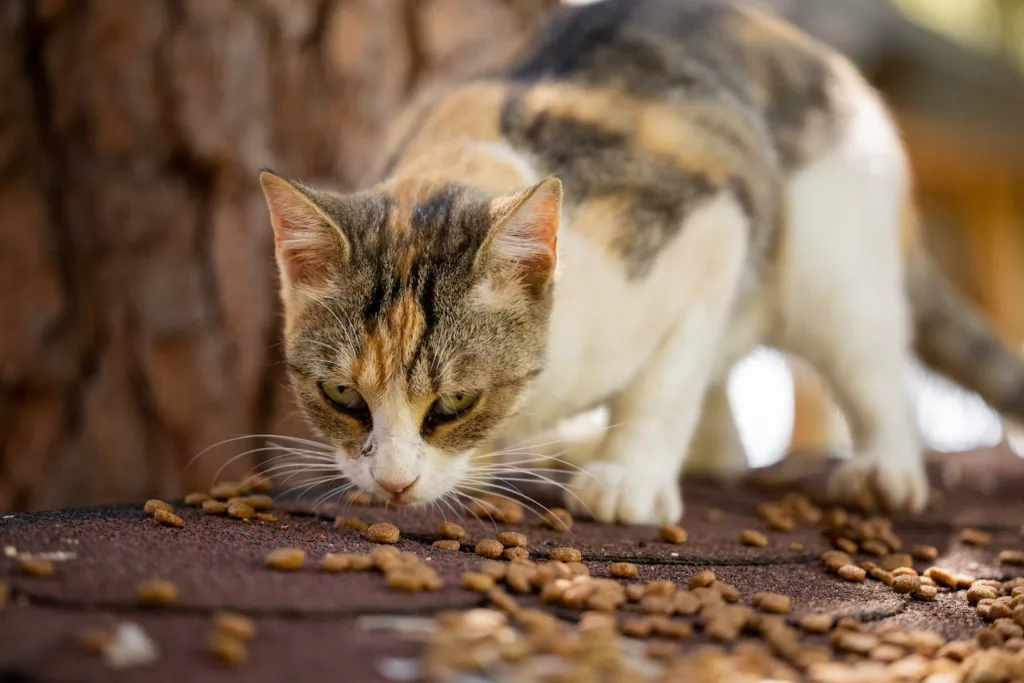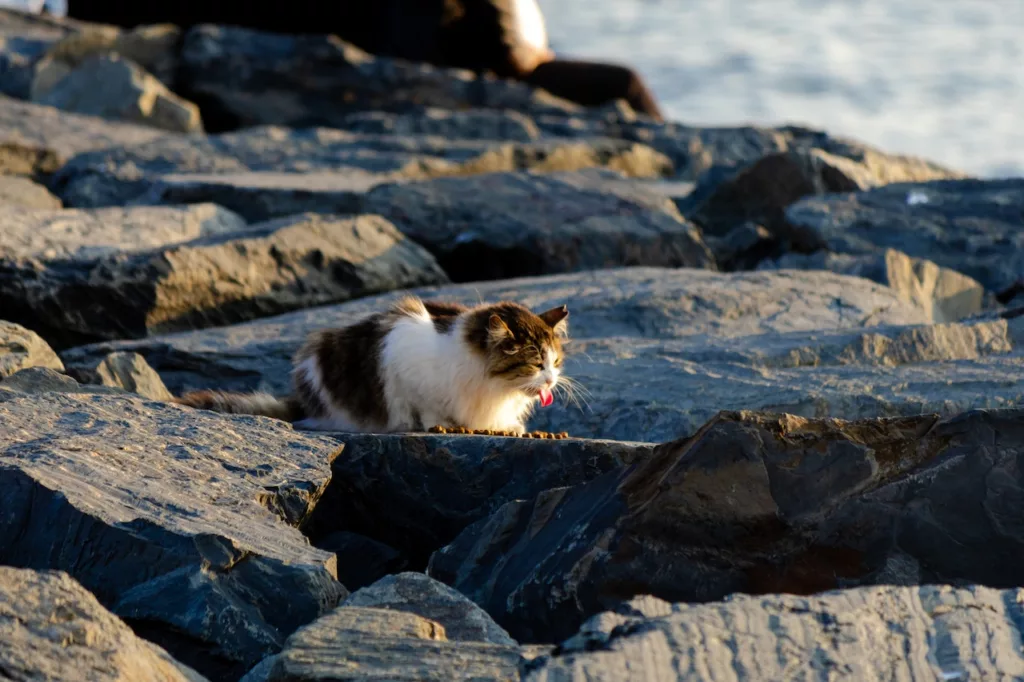Can cats eat peanut butter? Have you ever wondered if peanut butter is safe for cats? Maybe you’ve heard your dog-owning friends rave about how much their pets enjoy peanut butter. Can cats eat peanut butter the same way humans do? There is no simple answer to the question of whether cats can eat peanut butter: yes or no. Peanut butter is theoretically not toxic to cats. However, there are dietary and lifestyle reasons why you should not feed peanut butter to your cat. Always consult your veterinarian before giving your beloved cat any human food, including peanut butter. Here’s everything you need to know about peanut butter and cats.
Table of Contents
You may be interested in: How often do you take a cat to the vet?

Can cats eat peanut butter?
The short answer is yes, but not in excess. Peanut butter is not toxic to cats, but it’s not particularly useful either. Cats are obligate omnivores, which means that their bodies, unlike those of dogs or humans, are not designed to digest plant matter. Although peanut butter is not on the ASPCA’s list of toxic foods, it should only be given in small amounts as a treat or to administer medication.
Peanut butter is a delicious treat for humans and cats. It is rich in vitamins, minerals, proteins, healthy fats and other nutrients that keep the body healthy. Peanut butter is also low in sodium and carbohydrates. This makes it a healthy choice for most cat owners. However, not all brands are suitable for your feline friend. Many peanut butter brands contain xylitol, which is toxic to cats if consumed in large amounts. In general, cats should not eat regular peanut butter because it contains a lot of sodium and fat, as well as xanthan gum, which is harmful to them.
However, some brands of peanut butter can be consumed by cats without the risk of side effects or allergic reactions. Give your cat the actual food sparingly and in moderation. Because of its thick, sticky consistency, peanut butter can cause cats to swallow it. Peanuts are high in protein and fat, making them ideal for weight loss.
Peanut butter’s health benefits
Peanut butter is an extremely versatile snack. For some, it’s a high-protein way to lose weight, while others, like bodybuilders, enjoy it for its high calorie content. It helps build muscle mass. Peanut butter contains vitamins and minerals such as zinc, potassium, magnesium and vitamin B-6, but more important is its protein content. Peanut butter contains over seven grams of protein in just two tablespoons. That’s more protein than is found in an egg!
The inclusion of nuts such as peanuts and almonds in the human diet has also been linked to a decrease in heart disease in some studies. So peanut butter seems like an excellent addition to our diets. But what about our cats?
Also read : Can cats eat Avocado? Why is avocado toxic to cats?
The Dangers of Peanut Butter for Cats
Nutritional value
Although peanuts are high in protein and low in carbohydrates, your cat’s metabolism is geared toward animal protein. Peanut butter as a vegetable protein source does not provide all the amino acids your cat needs. Consequently, she cannot fully utilize the proteins found in peanuts. While peanuts are high in vitamin E and biotin, which are important for the development of your cat’s coat, skin and connective tissue, other foods such as fish or egg yolks are far better sources of these nutrients.
Peanut allergies
Peanut allergies can also occur in cats. Cats are generally prone to allergic reactions. These reactions may be present at birth or develop over time. Although adverse reactions to peanut butter are uncommon, they can be severe. Such reactions may even endanger your pet’s life. Therefore, it is important to know the possible clinical signs of cat allergies so that you can react quickly in an emergency.
Assume your cat develops swelling, itching, a runny nose, skin irritation, chronic ear infections, hair loss, diarrhea, vomiting, loss of appetite, or weight loss after eating peanuts or peanut butter. If this is the case, the cat is most likely allergic to nut butter. If you notice this in your pet, you should take him or her to the veterinarian as soon as possible. Don’t wait for a minor adverse reaction to turn into a major medical emergency.
Also read : Can Cats Eat Rice?

Harmful fats
Manufacturers hydrogenate the vegetable oil in peanut butter to make it more shelf stable. Low quality peanut butter can be extremely toxic due to its high content of trans fats. These fats are extremely dangerous for cats and should be avoided.
Peanut butter is even more dangerous in the long run because of its high-fat content, which can cause your cat to gain weight quickly and become obese. If your cat is overweight, you should never feed them peanut butter. Remember that obesity can lead to other health issues such as diabetes and heart disease.
Gastrointestinal complaints
Although it is uncommon in cats, excessive peanut butter consumption can result in gastrointestinal disorders such as diarrhea. Other symptoms of this medical condition include vomiting, diarrhea, lethargy, abdominal pain, straining to defecate, and/or a decrease in appetite.
Choking on peanut butter
Because peanut butter has a thick and sticky consistency, even in small amounts, it can easily get stuck in a cat’s throat. So, if you decide to feed your cat peanut butter on occasion, keep a close eye on it while it eats. This rule applies to all gooey treats, not just peanut butter. Additionally, ensure that your cat has access to fresh, clean water to wash down the peanut butter.
Aflatoxin
Peanuts contain a high level of aflatoxin. These are mycotoxins produced by a mold that colonizes the peanuts underground. Mycotoxins are among the most common causes of cancer on the planet. They can also harm the liver and even cause cancer. Most countries have authorities in charge of controlling the level of aflatoxins in food and ensuring that it stays below the recommended limit.
Poisoning according to ASPCA
Because many animals enjoy eating peanut butter, it is frequently combined with insecticide and rodenticide to attract and eliminate pests. Giving your cat peanut butter is especially dangerous if she is allowed to go outside. She will become accustomed to the taste, perhaps even come to enjoy it, and will be more vulnerable to being harmed by animal traps.
Xylitol
Traditional peanut butter, which we all grew up with and love, is made with ground peanuts as the main ingredient and oil to give it a creamy, smooth texture. Many companies nowadays sweeten peanut butter with sugar, honey, or molasses, and flavor it with salt.
However, with the recent emergence of anti-sugar sentiments in our society, many manufacturers have begun substituting xylitol for sugar. Chewing gum and baked goods frequently contain xylitol. Because of its low glycemic index, this artificial sweetener is frequently used in diabetic products, but it is highly toxic to animals. It can cause symptoms such as vomiting, lethargy, and loss of coordination, as well as seizures and liver failure.
Check the ingredient list on the label before giving peanut butter to your cat. If it contains xylitol, you should never feed it to your cat.
Can cats eat peanuts?
What about peanuts if peanut butter isn’t toxic? Peanuts, like peanut butter, are non-toxic to cats but should be tested sparingly. If you want your cat to try a peanut, make sure it’s raw and unsalted, as cats’ digestive systems aren’t designed to handle too many additives. They must be completely shelled as well. Many animals are choking on the hard outer shell of a peanut.
Another consideration with all nuts is allergies. Cats, like humans, can develop nut allergies. Keep an eye out for signs of skin irritation, vomiting, diarrhea, or other gastrointestinal issues.
Also read: Do dogs get tired of barking?

How can I feed peanut butter to my cat safely?
Consider the following recommendations if you want to feed peanut butter to your cat despite the risks associated with the product:
- Consult your veterinarian before giving your pet food for human consumption, even if the food is generally considered safe for animals.
- Feed in small amounts because cats aren’t used to eating peanuts. Treats should account for no more than 10% of your cat’s daily caloric intake, according to the Clinical Nutrition Service. As a result, you should only serve the animal peanut butter as an appetizer before the main course, and make sure to read the nutritional label on the peanut butter jar first. Because peanuts are high in calories, keep the serving size small.
- Make sure to use unsweetened, low-salt peanut butter free of xylitol. In addition, never feed chunky peanut butter to your pets.
Even non-toxic foods, according to the Clinical Nutrition Service, can cause unexpected reactions. So keep an eye out for signs of illness in your cat, such as vomiting or diarrhea. It is safe for your cat unless he is allergic to peanut butter. Keep in mind, however, that peanut butter is not good for your cat’s digestive system.
If your pet regularly consumes peanut butter, you can use it to administer medication because it can be easily mixed into powder or very small tablets.
Conclusion: Can cats eat peanut butter?
Peanut butter is a great treat for both humans and cats. It contains a high concentration of vitamins, minerals, proteins, healthy fats, and other nutrients. Peanut butter is also low in sodium and carbohydrates. This makes it a healthy choice for the majority of cat owners. However, not all brands are suitable for your feline companion. Many peanut butter contains xylitol, which is toxic to cats if consumed in large quantities.
Cats should avoid eating regular peanut butter because it contains a lot of sodium and fat, as well as xanthan gum, which is bad for them. Some brands of peanut butter, on the other hand, can be consumed by cats without the risk of side effects or allergic reactions.